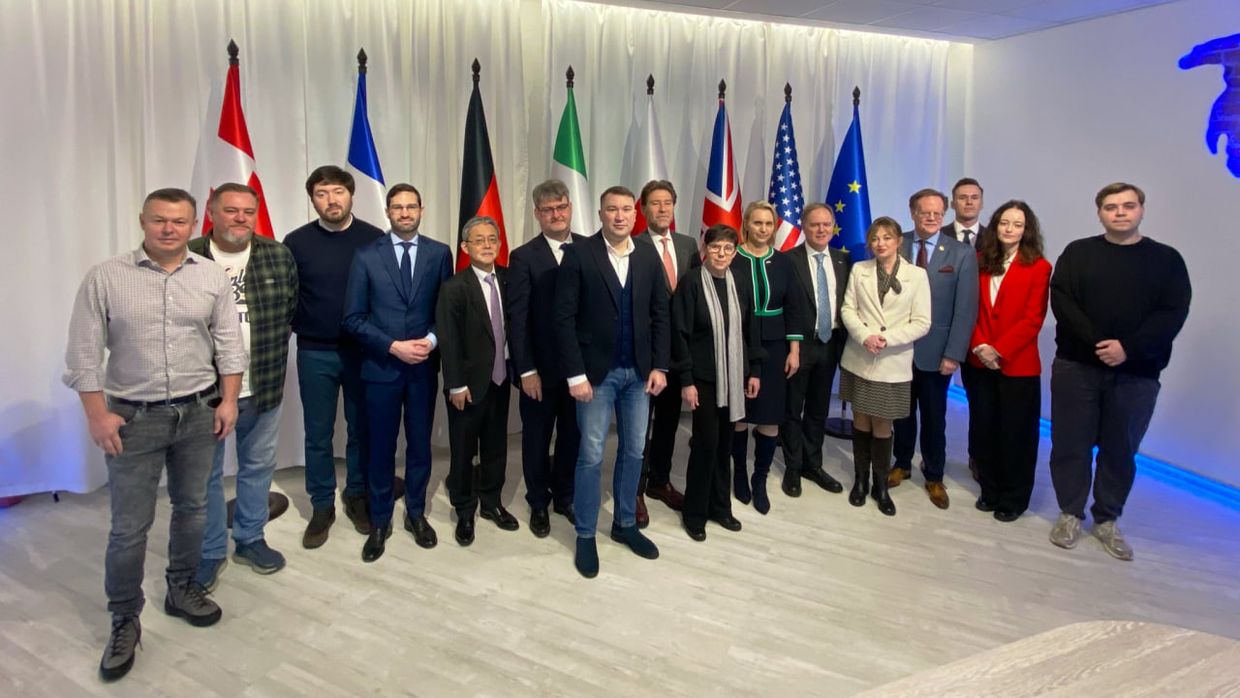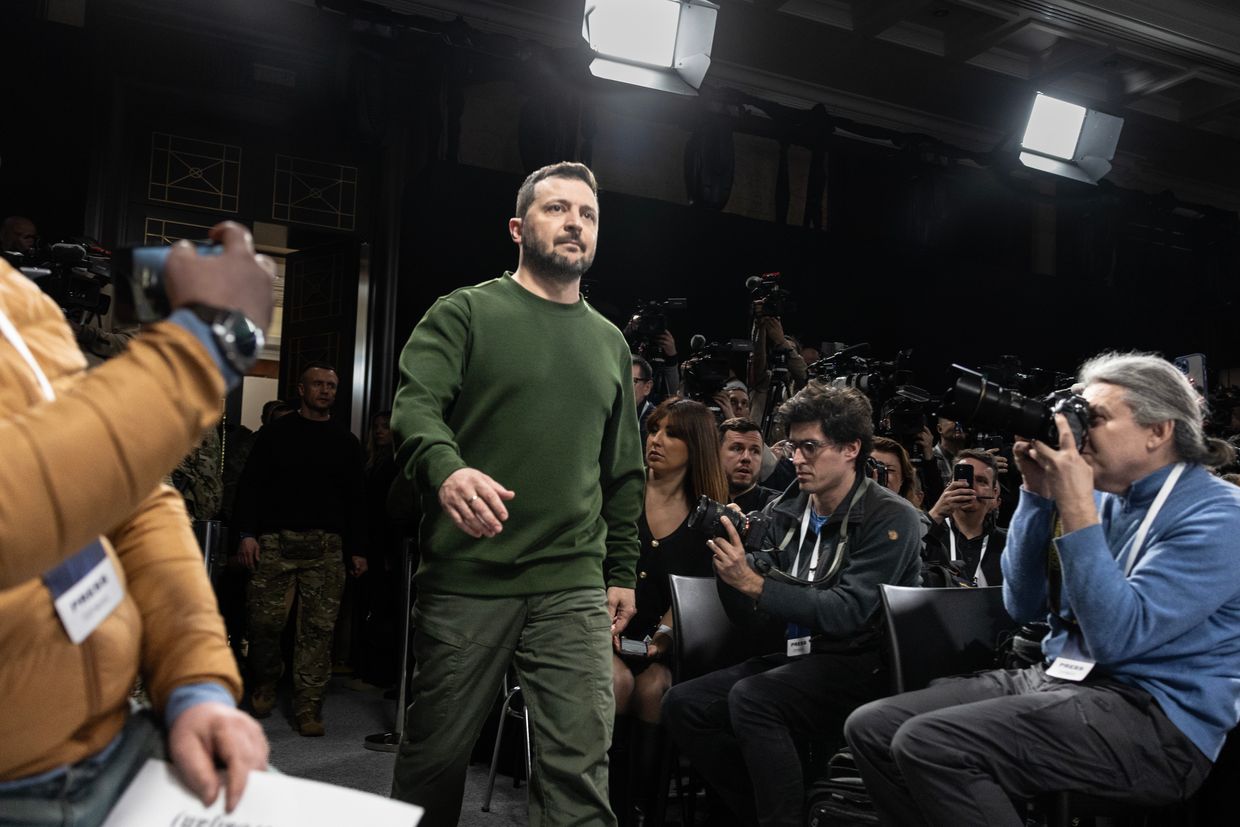"We have a plan B and a plan C. But our focus is plan A, the essence of which is to get everyone's support" for Ukraine's accession, EU foreign policy chief Kaja Kallas said.
"(T)he presence at the Victory Parade of a country that bombs cities, hospitals, and daycares, and which has caused the deaths and injuries of over a million people over three years, is a shame," Polish Prime Minister Donald Tusk said.
"According to the participants of the performances, their goal is to remind the civilized world of the barbaric actions of Moscow, which for many years and decades has systematically violated international law," a source in Ukraine’s military intelligence agency (HUR) told the Kyiv Independent.
"I have great hope that an agreement for a ceasefire in Ukraine will be reached this weekend," German Chancellor Friedrich Merz said on May 9, shortly before traveling to Kyiv alongside the leaders of France, Poland, and the U.K.
U.K. Prime Minister Keir Starmer, French President Emmanuel Macron, German Chancellor Friedrich Merz, and Polish Prime Minister Donald Tusk will arrive in Kyiv early on May 10.
The United States embassy in Kyiv on May 9 issued a warning that Russia could launch "a potentially significant" attack in the coming days, despite Putin's self-declared Victory Day "truce."
The sanctioned oil tankers have transported over $24 billion in cargo since 2024, according to Downing Street. The U.K. has now sanctioned more shadow fleet vessels than any other country.
The sanctions list includes 58 individuals and 74 companies, with 67 Russian enterprises related to military technology.
Washington and its partners are considering additional sanctions if the parties do not observe a ceasefire, with political and technical negotiations between Europe and the U.S. intensifying since last week, Reuters' source said.
Despite the Kremlin's announcement of a May 8–11 truce, heavy fighting continued in multiple regions throughout the front line.
Putin has done in Russia everything that Luiz Inacio Lula da Silva had been against in Brazil.
Ukrainian journalists meet G7 ambassadors to discuss country's media landscape

Ambassadors of the Group of Seven (G7) countries met with prominent Ukrainian journalists on Dec. 2 for a "valuable exchange" and to discuss "the current media landscape."
"Press freedom and pluralism are crucial for strengthening democracy, supporting political debate, and advancing Ukraine’s Euro-Atlantic path," the G7's representation in Ukraine said on X.
It marked the second such meeting this year, with the G7 envoys meeting Ukrainian journalists in January amid complaints of systematic state pressure on the media community.
Olga Rudenko, editor-in-chief of the Kyiv Independent; Vitalii Sych, editor-in-chief of NV; Andrii Boborykin, executive director of Ukrainska Pravda; Nataliia Lyhachova, director-in-chief of Detector Media; and Mykola Chernotytskyi, the CEO of the Suspilne public broadcaster attended the latest meeting.
Yurii Nikolov, an investigative journalist and co-founder of the Nashi Hroshi project; Nataliia Sedletska, head of the Kyiv bureau of Radio Free Europe/Radio Liberty; and Yevhen Shulhat, an investigative journalist, were also in attendance.
Nikolov and Shulhat themselves experienced pressure from the authorities in two separate cases this year that prompted a backlash from the journalistic community.
Nikolov, who revealed procurement wrongdoing in the Defense Ministry under its previous leadership, received a threatening visit to his home from two unknown men in January. Shulhat was allegedly targeted by military enlistment officers this spring amid his investigation into the family property of Illia Vitiuk, who was then the Security Service of Ukraine (SBU) cybersecurity chief.
Another major scandal revolved around leaked video recordings of non-editorial staff members of the Bihus.Info investigative outlet apparently using drugs during a New Year's party. Bihus.Info later released an investigation that said a department of the SBU installed the hidden cameras and leaked the videos to pressure the outlet.
Despite the subsequent public outcry and pledge by the authorities to rectify the situation, media watchdogs and journalists have continued to point to cases of attempted censorship, political interference, and other forms of pressure.
In one of the latest cases, Ukrainska Pravda said that the Presidential Office was systematically pressuring the outlet in an attempt to influence its editorial policy.
The outlet said that officials were being ordered not to communicate with its journalists, they were being denied access to official events, and businesses were being pressured to cease advertising on the outlet's website and not sponsor the events Ukrainska Pravda organizes.

Most Popular

After 3 years of full-scale war in Ukraine, Europe announces plan to ban all Russian gas imports

Ukraine, Europe's ceasefire proposal includes US security guarantees, no recognition of Crimea, Reuters reports

Journalist Roshchyna's body missing organs after Russian captivity, investigation says

After Russia's deadly attack on Kyiv, Vance reposts denunciation of Zelensky

Ukrainian sea drone downs Russian fighter jet in 'world-first' strike, intelligence says
Editors' Picks

How medics of Ukraine’s 3rd Assault Brigade deal with horrors of drone warfare

As Russia trains abducted children for war, Ukraine fights uphill battle to bring them home

'I just hate the Russians' — Kyiv district recovers from drone strike as ceasefire remains elusive


